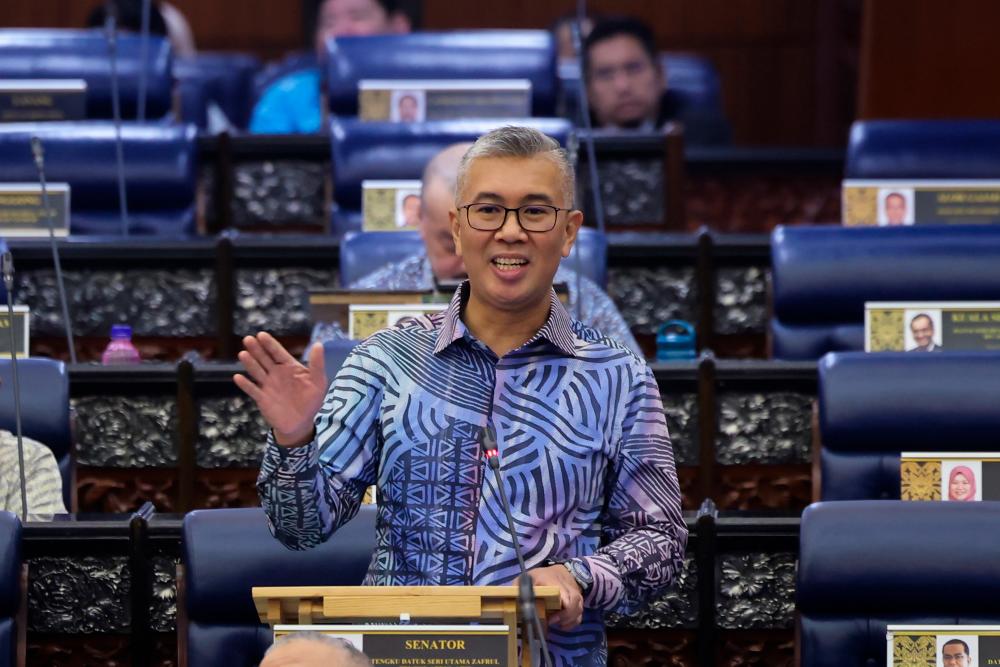KUALA LUMPUR: The risk of negative impact on semiconductor export performance to the United States following the implementation of tariff hikes by US President Donald Trump is seen as minimal for the time being, said the Ministry of Investment, Trade and Industry (Miti).
Minister Tengku Datuk Seri Zafrul Abdul Aziz said this is because Malaysia was excluded from the recent tariff increase imposed on several countries.
“Additionally, investment records show that investments from the US remain strong, as the country is among the largest investors, totalling RM5.1 billion in the third quarter of 2024,” he said during Minister’s Question Time in the Dewan Rakyat today.
Tengku Zafrul was responding to Datuk Ku Abd Rahman Ku Ismail (PN-Kubang Pasu), who asked Miti to outline the government’s steps in addressing geopolitical issues and global trade uncertainties, particularly the possibility of tariff increases that would affect Malaysia’s exports, especially to the US.
The minister said Malaysia signed a memorandum of cooperation on semiconductor supply chain resilience with the US on May 10, 2022. This agreement, he added, reflects the ongoing commitment of both countries to ensure a strong and resilient semiconductor supply chain and strengthen economic and strategic ties between Malaysia and the US.
“Therefore, the ministry is confident that existing investors from the US will remain in Malaysia and continue to grow to strengthen their global supply chain,” he said.
Tengku Zafrul said the US is Malaysia’s third-largest trading partner in 2024, with a trading volume of RM324.9 billion, accounting for 11.3% of Malaysia’s total trade.
“Exports to the United States amounted to RM198.6 billion, equivalent to 13.2% of Malaysia’s total exports, while imports from the United States reached RM126.3 billion, equivalent to 9.2% of Malaysia’s total imports. In terms of investment, the US is among the largest investors, and so far, Malaysia has become the preferred investment destination for more than 600 American companies.”
In this regard, Tengku Zafrul said, the government is proactively trying to maintain and strengthen the good and dynamic bilateral trade and investment relations with the US to avoid tariff increases such as those imposed on China, Canada, and Mexico.
The government will ensure that Malaysia remains a reliable trading and investment partner for all its partners, including the US. “This includes through a conducive and investor-friendly investment ecosystem, effective export control regulations and strategic trade management, as well as compliance with international standards that reassure investors,” he said.
On a another issue, Tengku Zafrul said the rise of different types of artificial intelligence (AI) technologies such as DeepSeek can reduce Malaysia's reliance on a single product.
The emergence of diverse AI technologies also enables Malaysia to become a neutral centre for AI companies from the west as well as those from the east, such as China, he added.
“Although this more efficient (type of) AI technology reduces the need for large data centres, its lower cost is expected to drive more widespread use, driving the demand for data centre services,” Tengku Zafrul said when responding to Datuk Seri Wee Jeck Seng’s (BN-Tanjung Piai) question on the impact of the rise of new AI technologies from China on data centre investors in Johor.
Tengku Zafrul said increasing AI efficiency does not reduce demand for data centres. Instead, they may increase AI use, stimulating investment concerning data. “The semiconductor supply chain will be diversified. If we look at Johor, Penang and Kedah, these strategic locations for AI infrastructure and data centres will not be affected.”
Hence, the next step is to ensure that Malaysia’s data centres have the cutting edge by introducing more enticing green investment incentives.
“We want to further encourage the AI and digital workforce and raise Malaysia's competitiveness as an AI processing centre by attracting more investment from AI companies, not only from the west but also from other countries. We also need to maintain diplomatic relations with the United States (US) and China to ensure our position as a neutral technology investment hub,“ Tengku Zafrul said. – Bernama









